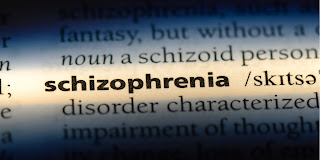Bryan Charnley, Self portrait art journal on Schizophrenia taking over while he experiments with medication dosages and stopping some. A few of his last self portraits that followed his suicide. May he rest in peace.
Psychological Concepts
The psychological concept of schizophrenia is the main abstract idea of what schizophrenia is all about, it is a chronic brain disorder that heavily and severely impacts all brain functions. This can include: thoughts, moods, emotions, and speech, other symptoms that make up Schizophrenia are delusions, hallucinations, disorganized speech, trouble with thinking and lack of motivation (What is schizophrenia?) The psyche is so incredibly impacted due to this disorder being associated within the brain that without the proper interventions, a person suffering from schizophrenia can spiral and lose control of their life.
Some results of not having interventions can lead to horrific effects like suicide, suicidal attempts/thoughts/behaviors, anxiety disorders, OCD, depression, illicit drug use, lack of being able to do work or school, financial problems or homelessness, social isolation, health and medical problems, being victimized, and even though it is uncommon, aggressive behavior. (Mayo Foundation for Medical Education and Research.) It's important for intervention and the ability to stay on track with that intervention so symptoms do not worsen, and they are able to have a better quality of life.
Psychological Theories
There is not a clear cut answer to why schizophrenia is caused, but there are theories on the why to the disorder. One of those theories includes that of Vascular-inflammatory and abnormalities in genes which theorizes that there is a disruption of the exquisitely precise regulation of the delivery of energy and oxygen that is required for normal brain function (Hanson, D. R., & Gottesman, I. I.) There is ample evidence of this inflammatory polymorphism which in simpler terms that it is a gene variant in the gene sequence or DNA (Genome.gov.) There is also other evidence that shows that inflammatory vascular disease of the brain can lead to psychosis which is a factor in schizophrenia. With this inflammation, there is often waxing and waning which exhibits a fluctuating course which is seen in Schizophrenia (Hanson, D. R., & Gottesman, I. I.)
Other gene theories include of schizophrenia being passed in the family. A few examples of this are , someone who has a genetically identical twin has a 50% chance of having schizophrenia (Possible causes of schizophrenia.) Another one would include a person with a sibling or parent who has schizophrenia has a 10% chance of having schizophrenia (Possible causes of schizophrenia.)
Other more well known theories of why schizophrenia may be caused is environmental influence some of which include fetuses during influenza epidemics and mothers who were starving while pregnant (Possible causes of schizophrenia.) While it seems weird, the reason could be the extreme stress that was presented at the time somehow interfered with brain development. Some other environmental factors are: Urbanicity, migration, illicit drugs, and childhood traumas (Vilain, J., Galliot, A. M., Durand-Roger, J., Leboyer, M., Llorca, P. M., Schürhoff, F., & Szöke, A.)
Model
The cognitive model is a great explanation on the symptoms on individuals with Schizophrenia. The model for Schizophrenia shows individuals that the basis of their view of the self is influenced by genetic vulnerability, early childhood experience and environmental stressors later in life are factors that determine how internal and external experiences are interpreted (Batinic B.) This model is the basic principle used in Cognitive Behavioral Therapy or CBT for those who suffer from Schizophrenia which helps them understand their symptoms and ways to cope with them as well as reduce stress that may be caused by psychosis experiences (Batinic B.)
Support Systems
Support systems for anyone is extremely important. When it comes to those with mental disorders, disabilities, etc, it can be crucial for someone to have that support to help them. For schizophrenia, it is important to remember that to: accept the illness and its difficulties, not buy into stereotypes and biases, do as much as one can do to make the person feel loved and feel better, paying attention to one's own needs, and to maintain a good attitude (Melinda.) Some other important tips is to educate about schizophrenia and learning about the disorder, the treatment, and how it can impact someone, reduce stress as it can cause schizophrenia to become worse, set realistic expectations about the challenges of the disorder, and empower the person by advocating and supporting them through all their struggles (Melinda.)
Some other great support systems for those who are supporting and have the disorder are joining schizophrenia support groups to gain additional support from others who know what it is like to have schizophrenia and for those who may have struggles supporting their schizophrenic loved ones.
Reference
What is schizophrenia? (n.d.). Retrieved October 13, 2021, from https://www.psychiatry.org/patients-families/schizophrenia/what-is-schizophrenia.
Hanson, D. R., & Gottesman, I. I. (2005). Theories of schizophrenia: a genetic-inflammatory-vascular synthesis. BMC medical genetics, 6, 7. https://doi.org/10.1186/1471-2350-6-7
Polymorphism. Genome.gov. (n.d.). Retrieved October 13, 2021, from https://www.genome.gov/genetics-glossary/Polymorphism.
Possible causes of schizophrenia. UNC Center for Excellence in Community Mental Health. (2018, October 18). Retrieved October 13, 2021, from https://www.med.unc.edu/psych/cecmh/archived-old-pages/iii-what-are-psychotic-disorders/possible-causes-of-schizophrenia/.
Vilain, J., Galliot, A. M., Durand-Roger, J., Leboyer, M., Llorca, P. M., Schürhoff, F., & Szöke, A. (2013). Les facteurs de risque environnementaux de la schizophrénie [Environmental risk factors for schizophrenia: a review]. L'Encephale, 39(1), 19–28. https://doi.org/10.1016/j.encep.2011.12.007
Mayo Foundation for Medical Education and Research. (2020, January 7). Schizophrenia. Mayo Clinic. Retrieved October 13, 2021, from https://www.mayoclinic.org/diseases-conditions/schizophrenia/symptoms-causes/syc-20354443.
Batinic B. (2019). Cognitive Models of Positive and Negative Symptoms of Schizophrenia and Implications for Treatment. Psychiatria Danubina, 31(Suppl 2), 181–184.
Melinda. (2021, April 19). Helping someone with schizophrenia. HelpGuide.org. Retrieved October 13, 2021, from https://www.helpguide.org/articles/mental-disorders/helping-someone-with-schizophrenia.htm.






Comments
Post a Comment